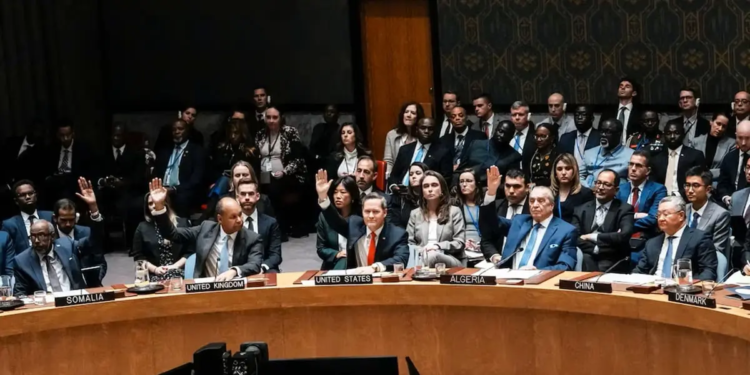UN Security Council resolution supporting US plan for Gazaincluding a permanent ceasefire and the deployment of an international stabilization force, arouses a largely skeptical reception in Gaza. On the ground, many Palestinians perceive this force not as a protection mechanism, but as a security device imposed without their consent.
A population suspicious of the announced mandate
According to testimonies collected in Gaza City and reported by Al Jazeera, the idea of an international force is associated with the fear of a new system of control. The planned mandate — including policing, border security and demilitarization functions — fuels the perception of an intrusive presence focused more on public order than reconstruction or humanitarian aid.
In a context where winter worsens the situation of displaced people, local authorities recall that 300,000 additional tents are needed to deal with the emergency. Many question the real capacity of this force to prevent further Israeli strikes or to improve humanitarian conditions.
Hamas rejects, Palestinian Authority approves
Political reactions are mixed.
Hamas, in power in Gaza, rejected the resolution, which it considers insufficient and biased. The movement believes that entrusting an international force with the mission of disarming armed groups amounts to “promoting the occupation” and removing all neutrality from the system.
Conversely, the Palestinian Authority, based in Ramallah, welcomed the text. In a press release relayed by the Wafa agency, she affirms that the resolution lays the foundations for a lasting ceasefire, guarantees access for humanitarian aid and reaffirms the right of the Palestinian people to self-determination. The government says it is ready to cooperate with the UN and Washington for the implementation of the plan.
A non-UN international force
According to Daniel Forti, an analyst at the International Crisis Group, the force approved by the Security Council will not be a peacekeeping mission. It will not be led by the UN, but by a voluntary coalition benefiting from the legitimacy of the Council. Funding, troop deployment and intervention rules will depend on contributing states, and not on usual UN procedures.
NGOs active in Gaza, however, stress that such a mission should have a clear mandate allowing it to maintain order in a deeply devastated territory.
Positions within the Security Council
Several Council members justified their vote in favor of the resolution.
- The UK has spoken of the need to open all crossing points and speed up aid.
- France highlighted peace efforts and humanitarian priority.
- South Korea welcomed the return of aid and the planned governance structure.
- Slovenia stressed that the text represents the best chance to move towards lasting peace.
- Denmark has insisted on the future reunification of Gaza and the West Bank under a reformed Palestinian Authority.
- China supported the goal of a permanent ceasefire but expressed reservations about the international force mechanism, calling for ensuring its impartiality and avoiding any measures that could fuel tensions. Beijing has insisted on the need to protect civilians and respect international law.
- Russia, for its part, criticized the American plan, saying it does not sufficiently respond to urgent humanitarian needs and risks legitimizing imposed security arrangements. Moscow denounced a text that it considered unbalanced but did not block its adoption, while calling for a more neutral and truly multilateral international role.
According to Gaza health authorities, 69,483 Palestinians have been killed and 170,706 injured since October 2023. The humanitarian situation remains extremely critical, with infrastructure largely destroyed and needs growing.
Also read:








